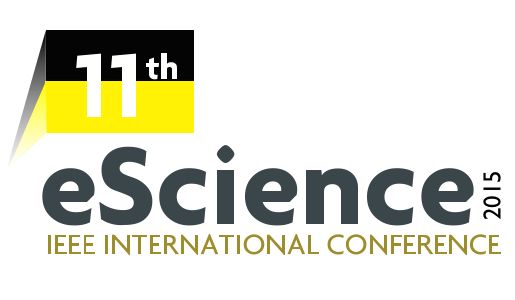Register for IEEE eScience 2015 by August 15

IEEE eScience 2015, a key international event, is kicking off in a couple of weeks' time. Register now!
New Zealand is on show with several talks accepted with contributions by New Zealanders:
Prashant Gupta, Mark Gahegan and Gill Dobbie. “Adventures of Categories: Modeling the evolution of categories during scientific investigation.”
Kyle Chard, Jim Pruyne, Ben Blaiszik, Rachana Ananthakrishnan, Steven Tuecke and Ian Foster. “Globus Data Publication as a Service: Lowering Barriers to Reproducible Science.”
Ryan Chard, Kyle Chard, Kris Bubendorfer, Ravi Madduri and Ian Foster. “Cost-Aware Resource Provisioning for Cloud-based Scientific Workflows.”
Click the links for a detailed listing of accepted papers and the detailed programme.
"IEEE eScience is always an eye opening event, bringing together thought leaders from around the world for an inspiring event," notes NeSI's Director Nick Jones, a member of this year's programme committee.
The annual IEEE eScience conference will be held in Munich, Germany from 31st August to 4th September 2015. The objective of the eScience Conference is to promote and encourage all aspects of eScience and its associated technologies, applications, and tools.
The term eScience is considered in its broadest meaning – effectively any technical, organisational or cultural aspect of the digital revolution of research is a relevant topic. In short, eScience promotes innovation in collaborative, computationally- or data-intensive research across all disciplines, throughout the research lifecycle.
This digital revolution has already fundamentally transformed several fields, and created specialised eScience disciplines dealing with computing-related challenges and opportunities, as demonstrated by the developments in:
- Arts, humanities (including Digital Humanities) and e-Social science
- Bioinformatics and e-Health
- Physical Sciences and Engineering
- Climate, Environmental & Earth Sciences
At the same time, eScience itself has become a topic of specialised research, engineering and outreach activities, such as:
- Data science, data management and digital repositories
- Cyberinfrastructure to support e-Science, including novel hardware, software and services
- e-Science in the cloud
- Education and e-Science practice
The hope is that the eScience conferences will not only enable more efficient research activities within disciplines, but also support wide range of transdisciplinary collaboration and sharing of best practices between established researchers, citizen scientists and other interested parties, and with the society as a whole!





